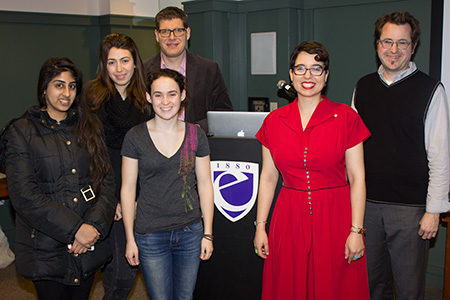Net neutrality tackled in Emerson talk

Assistant Professor Russell Newman (far right) hosted a discussion on net neutrality March 3 in the Beard Room. From left are some audience members: Sakshi Bathija ’18, Daniela Abraham ’17, Camille Speer ’18, Assistant Professor Vincent Raynault (Comm. Studies), and Assistant Professor Sarah Zaidan (VMA). (Photo by Dan O’Brien)
Journalist-turned-activist Craig Aaron of Free Press joined Emerson students via Skype on March 3 to talk about the recent Federal Communications Commission vote in favor of net neutrality, which essentially prohibits broadband companies from establishing “pay-to-play” models that interfere with free-flowing web traffic.
“It’s a remarkable and unprecedented victory in a situation where the telecommunication companies are used to getting their way,” Aaron said. “This was like turning around the Titanic.”
Free Press is an organization that advocates for free speech, free press, and curbing media consolidation.
The discussion in the Beard Room of the Little Building was hosted by Russell Newman, assistant professor in Emerson’s Institute for Liberal Arts and Interdisciplinary Studies.
Newman played a video of the FCC vote in favor of net neutrality rules on February 26.
“The Internet is simply too important to allow broadband providers to be making the rules,” said Tom Wheeler, chair of the FCC, who Aaron pointed out is formerly a telecommunications lobbyist.
Aaron said that when President Obama recently spoke in favor of net neutrality, “that gave Wheeler the political space to make him move.”
“For a long time, the White House decided to stay out of this,” Aaron said. “But [Wheeler] realized this is what his legacy would be.”
Aaron said he was heavily involved in activist work in favor of net neutrality. The new rules, the language of which Aaron said has not been finalized, would prohibit broadband companies from establishing paying models that would result in faster service for some and slower service for others.
The net neutrality vote technically is an alteration of Title II of the Communications Act of 1934 and Section 706 of the Telecommunications Act of 1996, which re-classifies broadband Internet as a telecommunications service, similar to telephones.
“This decision was very much the direct result of activism and organizing,” Aaron said. “There were 4,000 [public] comments made to the FCC.”
Aaron cited examples of corporations like AT&T and Verizon trying to charge customers for services like FaceTime on top of already established data plans.
Aaron expects there to be lawsuits and attempts by political opponents to alter final language of the net neutrality decision; but sees the FCC’s vote as ultimately positive.
“It’s really a tremendous accomplishment,” he said.
Categories